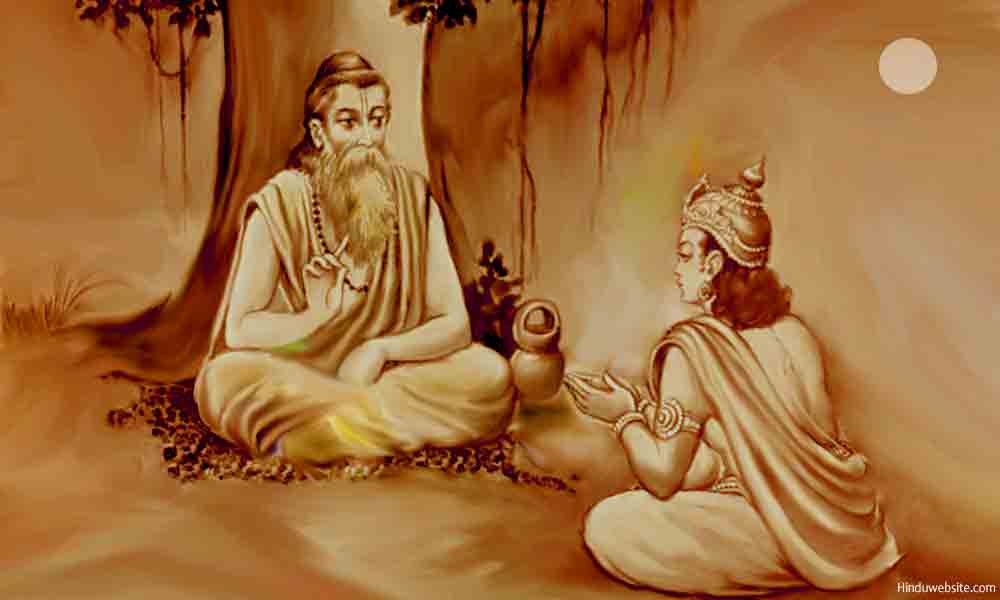
Ashtavakra Samhita, Chapter 1, Verse 14

Contents
Index, Verse 1, Verse 2, Verse 3, Verse 4, Verse 5, Verse 6, Verse 7, Verse 8, Verse 9, Verse 10, Verse 11, Verse 12, Verse 13, Verse 14, Verse 15, Verse 16, Verse 17, Verse 18, Verse 19, Verse 20
Verse 14
dehaabhimana paashena chiram
baddho asi puthrak
bodhoaham jnaana khadgena thannikruthya sukhee bhava
Translation
You have been caught for long in the bonds of body love, son. Knowing the Self by cutting that (the attachment) with the sword of knowledge, you will be happy.
Meaning
Overcoming your attachment to the body
The verse states the problem, suggests the solution, and the means to achieve it. Love or pride for the body is the problem. The solution is to realize that you are not the body or the mind but the eternal Self. The means to achieve it is by developing detachment towards to the body, by cutting the bonds through renunciation. It is a complicated problem because attachment to the body persists and gains strength over several lifetimes and getting rid of it will not be easy. If it is easier, many people would have achieved liberation, but we know that only a few out of millions of people succeed in the effort.
Your body is your immediate world and sanctuary. In your wakeful consciousness you are never separate from it. You also depend upon it for various tasks. Since it is vital to your survival and existence, you will do everything possible to protect it from harm and danger. Therefore, it is natural that you accept it as part of your identity and develop a strong attachment to it.
The world is caught in the love of the body and attachment to name and form. People cannot be sure of their souls, but they can be certain about their bodies and how it serves them. Therefore, they spend more time think about them rather than their souls. You do not need much evidence to prove how obsessed people are about their bodies and their appearance. Just look around you, and you will realize how people are caught in the love of their bodies.
Your body is the visible aspect of your personality. It is the basis of your identity and relationships. Many industries, businesses, literary activities thrive on the special connection humans develop towards their bodies and their appearance. Even yoga has become a form of physical exercise rather than a spiritual practice to experience self-absorption.
It is by how you appear to others that people form opinions about you and decide how to treat you or relate to you. It does not matter to many when they are young whether the body is subject to aging and decay. They live and act as if it is not going to happen to them. Only few people manage to age gracefully, without resisting the force of Nature that acts upon them. You are bound to your bodies because it is your primary abode, and your first refuge. You live in it and depend upon it. Therefore, it is natural that people form a special attachment to it.
Deha abhimanam is not only having the love for body but also taking pride in it, and using it as the refuge to establish relationships with the world. Your attachment to the body manifests in other ways, as love for comforts, luxury, jewelry, clothing, sexual pleasure, make up, and so on. It also manifests as love for the body of the person with whom you form a physical or mental, sexual relationship. It is said that human beings cannot live in peace if they are deprived for long physical contact with others. People need to be touched, hugged and loved to feel comfortable, loved and needed.
Ashtavakra says that you need to overcome the special relationship that you form with your body, using knowledge as the sword. Here, the knowledge he is referring to is the knowledge of the Self or the awareness that you are not the body but the eternal Self. Armed with that knowledge, you should take refuge in your Self rather than your body. From that come freedom from afflictions, duality, delusion, ignorance, instability, and modifications. It leads to peace and happiness or the blissful state of being free from bondage and suffering.
Suggestions for Further Reading
- Om, Aum, Pranava or Nada in Mantra and Yoga Traditions
- Brahmacharya or Celibacy in Hinduism
- Atheism and Materialism in Ancient India
- Solving the Hindu Caste System
- How To Choose Your Spiritual Guru?
- Creation in Hinduism As a Transformative Evolutionary Process
- Wealth and Duty in Hinduism
- Do You Have Any Plans For Your Rebirth or Reincarnation?
- Understanding Death and Impermanence
- Lessons from the Dance of Kali, the Mother Nature
- Letting your God live in You - The True Essence of the Hindu Way of Life
- prajnanam brahma - Brahman is Intelligence
- Maslow's Hierarchy Of Needs From The Perspective Of Hinduism
- The Definition and Concept of Maya in Hinduism
- The Meaning of Nirvana
- Self-knowledge, Difficulties in Knowing Yourself
- Hinduism - Sex and Gurus
- The Construction of Hinduism
- The Meaning and Significance of Heart in Hinduism
- The Origin and Significance of the Epic Mahabharata
- The True Meaning of Prakriti in Hinduism
- Three Myths about Hinduism
- What is Your Notion of God?
- Why Hinduism is a Preferred Choice for Educated Hindus
- Essays On Dharma
- Esoteric Mystic Hinduism
- Introduction to Hinduism
- Hindu Way of Life
- Essays On Karma
- Hindu Rites and Rituals
- The Origin of The Sanskrit Language
- Symbolism in Hinduism
- Essays on The Upanishads
- Concepts of Hinduism
- Essays on Atman
- Hindu Festivals
- Spiritual Practice
- Right Living
- Yoga of Sorrow
- Happiness
- Mental Health
- Concepts of Buddhism
- General Essays